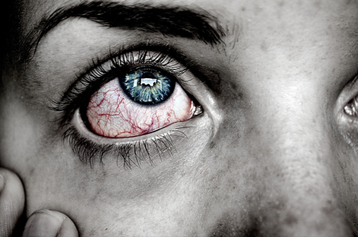~Information provided by the National Eye Institute. ~
What is dry eye?
Dry eye happens when your eyes don’t make enough tears to stay wet, or when your tears don’t work correctly. This can make your eyes feel uncomfortable, and in some cases, it can also cause vision problems.
Dry eye is common — it affects millions of Americans every year. The good news is that if you have dry eyes, there are lots of things you can do to keep your eyes healthy and stay comfortable.
At a Glance: Dry Eye
Dry eye can cause:
Dry eye happens when your eyes don’t make enough tears to stay wet, or when your tears don’t work correctly. This can make your eyes feel uncomfortable, and in some cases, it can also cause vision problems.
Dry eye is common — it affects millions of Americans every year. The good news is that if you have dry eyes, there are lots of things you can do to keep your eyes healthy and stay comfortable.
At a Glance: Dry Eye
- Symptoms: Burning, dry or scratchy feeling, blurry vision, red eyes
- Diagnosis: Dilated eye exam, measuring amount and thickness of tears
- Treatment: Medicine (usually eye drops), lifestyle changes
Dry eye can cause:
- A scratchy feeling, like there’s something in your eye
- Stinging or burning feelings in your eye
- Red eyes
- Sensitivity to light
- Blurry vision
What causes dry eyes?
Normally, glands above your eyes make tears that keep your eyes wet. Dry eye happens when your tears don’t do their job. This could mean:
Normally, glands above your eyes make tears that keep your eyes wet. Dry eye happens when your tears don’t do their job. This could mean:
- Your glands don’t make enough tears to keep your eyes wet
- Your tears dry up too fast
- Your tears just don’t work well enough to keep your eyes wet
What else can cause dry eyes?
Other causes of dry eyes include:
Other causes of dry eyes include:
- Medicines. Dry eye can be a side effect of some medicines that treat conditions like colds and allergies, depression, and high blood pressure.
- Health problems. Some health problems — including diabetes, thyroid problems, and autoimmune disorders like lupus or Sjögren syndrome — can cause dry eyes.
- Laser eye surgery. After some types of laser surgery, your eyes may produce fewer tears. Ask your eye doctor how long this side effect usually lasts and let them know if you have any questions or concerns.
- Windy, smoky, or dry environments. Spending time in these types of places can cause your tears to dry up faster and lead to dry eyes.
- Looking at screens for prolonged periods of time. You may blink less when looking at computer or tablet screens, which can lead to dry eyes.
~Information provided by the National Eye Institute. ~
Dry eye syndrome occasionally makes wearing contact lenses impossible.[2]
Dry eye syndrome is a common eye disease. It affects 5–34% of people to some degree depending on the population looked at. Among older people it affects up to 70%.
-Wikipedia
Dry eye syndrome is a common eye disease. It affects 5–34% of people to some degree depending on the population looked at. Among older people it affects up to 70%.
-Wikipedia
I'm pretty sure I have Dry Eye Syndrome.....NOW WHAT?




